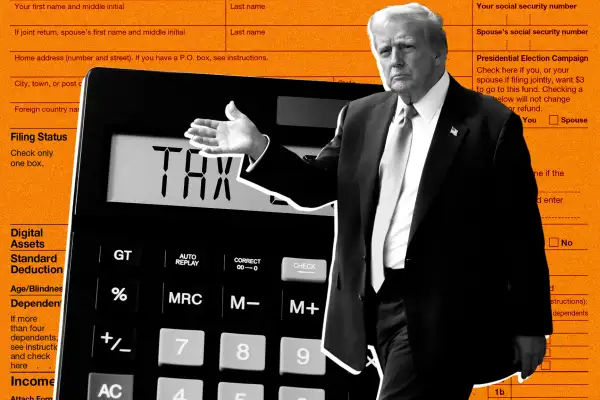Now That Trump's 'Big, Beautiful' Bill Is Law, Here Are the Major Tax Changes

President Donald Trump signed the "big, beautiful" bill into law during a ceremony at the White House Friday, kicking off the Fourth of July with a slew of tax code changes primed to affect millions of Americans.
"This is a triumph of democracy on the birthday of democracy, and I have to say that the people are happy," Trump said.
The House of Representatives voted 218 to 214 the day before to pass a final version of the bill that will extend significant income tax cuts, increase the child tax credit and expand the standard deduction.
Republicans are celebrating what they're calling a historic tax break for Americans. The legislation delivers on many of Trump’s economic promises, featuring "no tax on tips" and "no tax on overtime" provisions. But it doesn't do everything the president wanted: For example, it does not eliminate taxes on Social Security benefits; instead, it includes a smaller temporary tax deduction for Americans 65 and up.
Republicans are paying for the tax cuts, along with additional funding for beefing up border security, with steep cuts to safety net programs, including Medicaid and Supplemental Nutrition Assistance Program (SNAP). More than 11 million people are at risk of losing health insurance through the cuts to Medicaid, according to a Congressional Budget Office (CBO) estimate.
But even after accounting for those savings, the first major legislative package for the GOP-controlled 119th Congress comes with a large price tag for the country. A CBO score estimated the Senate version of the bill would add $3.3 trillion to the nation's debt over 10 years.
Democrats are also criticizing the temporary nature of some of the tax cuts. "Tax breaks for billionaires: permanent. Tax breaks for everybody else expire," House Democratic Leader Hakeem Jeffries said around the seven-hour mark of a long speech Thursday delaying the vote on the bill.
The law includes sweeping changes in several areas that will impact Americans' wallets, from taxes to environmental policy to student loans. Here are the key tax changes to know:
Extends the Tax Cuts and Jobs Act
Several provisions in the 2017 Tax Cuts and Jobs Act, which lowered federal income tax rates by several percentage points, were previously due to sunset at the end of the year.
The tax bill removes the sunset date. These are the tax rates the bill will cement:
- 10% rate — no change from the 2017 rate (applies to your first $11,925 of taxable income after deductions in 2025)
- 12% rate — down from 15% ($11,925 to $48,475 in 2025)
- 22% rate — down from 25% ($48,475 to $103,350)
- 24% rate — down from 28% ($103,350 to $197,300)
- 32% rate — down from 33% ($197,300 to $250,525)
- 35% rate — no change ($250,525 to $626,350)
- 37% rate — down from 39.6% ($626,350 and up)
"No tax on tips" and "no tax on overtime"
Income from cash tips will be exempt from federal income taxes starting this tax year through a deduction that will benefit millions of workers in the food and beverage industry, as well as barbering and hair care, nail care, esthetics and body and spa treatment. The bill includes a Dec. 31, 2028, sunset clause for the no-tax-on-tips deduction, meaning the relief will be available for most of Trump's presidency. The bill caps the deduction at $25,000.
Another section of the bill exempts overtime pay from federal tax through a similar deduction that will also sunset around the end of Trump's second term. The no-tax-on-overtime plan will apply to overtime over 40 weekly hours but will exclude highly compensated employees, which are those who perform "executive, administrative, professional and outside sales" duties. The deduction will be capped at $12,500 for individuals.
Payroll taxes will still apply to overtime and cash tips.
Kills the EV tax credit
The tax bill will eliminate the $7,500 EV tax credit effective Sept. 30. EV shoppers still have a window to shop for an electric vehicle and get the tax credit, but time is running out.
The tax credit has helped many buyers justify purchasing EVs, which are still more expensive than gas cars. Even stronger incentives have been available on EV leases, while some used electric-car buyers have been eligible for a tax credit up to $4,000.
All of these credits will be terminated by the bill. As a result, EV sales are expected to drop later in the year, but there may be a short-term rush of demand while tax credit is still available.
Creates Trump Accounts for kids
One of the more surprising inclusions in the version of the bill laid out by the House was a plan to create "MAGA Accounts" (or "money account[s] for growth and advancement") for children.
Before passing its version of the bill, the House amended the language to change the name of these savings vehicles to "Trump Accounts," and the Senate stuck with that name.
These accounts will be tax-preferred, but the funds will be tied up until the child in question turns 18.
The annual contribution limit will be $5,000, allowing parents to set aside money for college or other endeavors. The eye-popping part of the proposal: The government will make a one-time contribution of $1,000 to the accounts of children born from 2025 through 2028.
"[Trump] accounts would empower American children to reap the American Dream with a strong financial foundation," a Trump spokesperson said in a statement to media.
Increases the standard deduction
The standard deduction, available to taxpayers who do not opt to itemize their taxes, is a set amount of income that you don’t need to pay federal taxes on.
Trump's tax bill extends standard deduction increases from the Tax Cuts and Jobs Act, or TCJA, overhaul, which nearly doubled it from previous levels. It also makes two key changes to the standard deduction: First, the bill bumps up the deduction by $750 for single filers and $1,500 for couples. The new standard deduction would be $31,500 for couples and $15,750 for single filers starting this tax year. Second, there will be an extra deduction for older Americans of $6,000 through 2028, although income caps would determine eligibility.
Allows a charitable-contribution deduction for non-itemizers
While the tax code currently incentivizes charitable contributions among people who itemize their taxes, there's no such tax benefit for the majority of folks who are better off taking the standard deduction. Trump's tax bill will change that. The bill allows non-itemizers to claim an above-the-line deduction of $1,000 for single filers and $2,000 for married couples filing jointly.
Ups the child tax credit
The child tax credit has provided a $2,000 per child benefit for folks with kids under age 17, and families are eligible for the full amount if they earn up to $200,000, ($400,000 if filing jointly). The bill increases the credit by $200 to $2,200 per child — a smaller bump than a $500 increase proposed in an earlier House version of the bill.
The proposed changes won't benefit all households: Democrats have criticized stricter citizenship requirements that they say could reduce eligibility for 2 million kids. The bill stipulates that parents and children would need Social Security numbers to qualify for the credit.
There is precedent (and, typically, bipartisan support) for raising the tax credit. During the pandemic, the child tax credit was notably expanded in 2021 by the American Rescue Plan, reaching up to $3,600 for some families with young kids. But that was a temporary measure, and in 2022 the credit went back to the $2,000 level.
Weakens the estate tax
The tax bill will make increases to 2017 estate tax exemptions permanent. Current estate taxes apply when transfer amounts exceed $13.99 million for single filers and $27.98 million for joint filers.
The bill increases the levels to $15 million for individuals and $30 million for couples in 2026 and indexes them to inflation, meaning that even fewer wealthy families will be subject to this taxation.
More from Money:
7 Best Tax Relief Companies of May 2025
Here Are the Federal Income Tax Brackets for This Year
The IRS’s Free Direct File Program Is on the Chopping Block. What Went Wrong?





